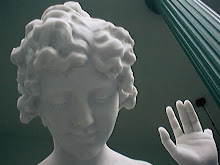Late on the Mad Men bandwagon, I have spent the last two weeks in a feverish reverie, watching as fast as I could to complete the first two seasons before the season three premier.
Television episodes designed for hour broadcast are actually about 47 minutes long, to allow for commercial breaks. When watched on DVD or on cable-on-demand or internet streaming, the stories can flow seamlessly without stopping, like movies. Suddenly, without the constant interruptions of loud and annoying commercials, the attention span is restored, the wandering around the house stops, the internet surfing idles. The lie of multi-tasking is laid aside, and one can be completely absorbed in the characters, plots, and subtleties. In conjunction with storylines that arc across multiple episodes, even across multiple seasons, the viewer can be drawn into a dreamlike immersion in story.
With a complete season of disks, an entire weekend can be consumed watching an epislam of episodes. Easy obsession that is cheap to satisfy and less destructive than many other weekend hobbies. Like civil war re-enactors who immerse themselves in a long re-creation of experience with such verisimillitude that they experience "period rush" and "Civil War-Gasm", the viewer of an entire season of Mad Men can feel like they have smoked a carton of cigarettes, clinked a couple dozen of ice filled glasses, and sat in perplexed and moody silence until the new era dawns. Like collectors of particular vintage artifacts, viewers can suffer "completism," in which every episode must be watched in chronological order, every commentary track parsed, every set of credits analyzed.
A Google blog search of "dvd watching mad OR men, OR wire, OR lost, OR true OR blood" turns up over 1,295,416 hits; the addition of the word "obsessed" narrows the results to 51,027. How many people do you know who've told you they were watching one of these popular series from end to end?
But Mad Men has a special hold on me. My parents were the same age as Don and Betty Draper at the same time in which the series is set; my father commuted to New York City from the suburbs; came home late on the train; traveled in a world of men and cocktails and golf, riding elevators in office buildings and having secretaries sit outside his glass windowed skyscraper offices. The sheer virtuosity of this recreated world has transfixed me, the details enhancing the effects of the "period rush." And the characters, beautifully clothed and riddled with flaws, mysteries, and self-occlusion, are fascinating in a way that is rare in television or movies of any kind. Like the opening credits, in which a stylized Don Draper falls through the caverns of skyscapers covered with advertising images, so I have fallen prey to series-itis, a benign ailment at worse, and at best, a dream to wallow in for a weekend or two.


